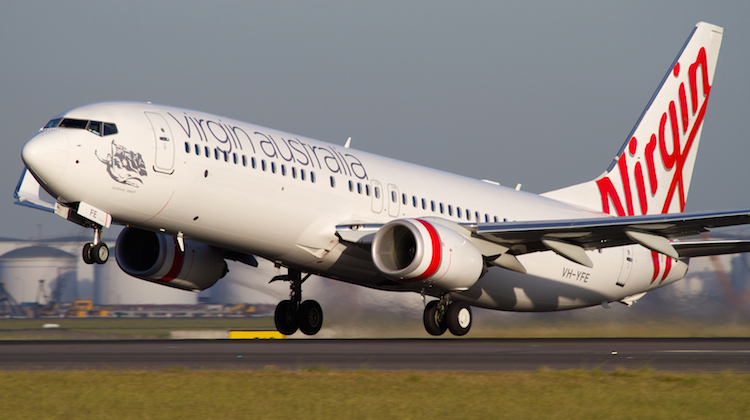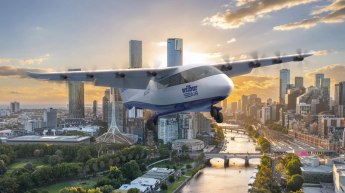
Virgin Australia will manage the cargo space in its fleet of regional, domestic and short-haul international aircraft from July 1 as it seeks to improve the performance of its freight unit.
The move to bring cargo back in-house comes as Virgin’s contact with Toll for the belly space of its passenger fleet is due to end on June 30 and reflects the airline’s transformation from low-cost carrier Virgin Blue to full service Virgin Australia.
Virgin Australia group executive for cargo Merren McArthur says the airline’s cargo division has not kept pace with the growth in passenger numbers and increased share of the corporate and government sector.
“Our business model has changed but we haven’t seen the growth in take-up of cargo on our capacity that we would expect with that sort of change in business model,” McArthur said on Monday.
“We have taken the decision that we really need to take control back of our own assets and leverage them and extract the maximum value from them because they are currently under-utilised.
“I see this as really a parallel to what we have done in the corporate passenger market where we have brought competition and offered an alternative and people have really warmed to that and responded to that in a positive way.”
From July 1, Virgin will sell and manage the belly space in the passenger fleet of its Boeing 737, Airbus A330 and Embraer E190s, as well as Tigerair Australia’s A320s and the ATR turboprops and Fokker fleet of Virgin Australia Regional Airlines.
Cargo sales on Virgin’s fleet of five Boeing 777-300ERs, which fly to Los Angeles and Abu Dhabi, will continue to be managed by Virgin Atlantic.
“We don’t intend to take on the major players in the global freight market with five 777 aircraft so the outsourcing model we think is still the best model and we are very happy with the Virgin Atlantic partnership,” McArthur said.
McArthur said interest from potential customers had been high since Virgin chief executive John Borghetti first mooted the airline’s direct entry into the cargo market at the 2013/14 full year results.
“There are a number of customers in the market who prefer to deal with the airline direct either for competitive or commercial reasons,” McArthur said.
“We believe that we will attract some of those customers to us going forward.
“Currently there is only one player in that space so we will be bringing competition.”
Virgin hoped its cargo division will bring in between $150 million and $200 million in annual revenue by 2017.
McArthur, who described the local cargo market as stable, said there were no immediate plans to add dedicated freighter aircraft to the airline’s fleet, given the current passenger aircraft were being under utilised from a cargo perspective.
“Our goal is not really dependent on growth of the domestic market. Our goal is about actually expanding our client base from one customer to multiple customers and generating a significant increase in revenue that way,” McArthur said
McArthur said Virgin would also tap into the cargo expertise of its alliance partners such as Singapore Airlines, Etihad Airways and Air New Zealand as it built up its cargo unit.
















Freddie
says:In my experience both domestic airlines from the Ansett and TAA/Qantas days operated aircraft as total freighters i.e. Electras and some 727’s. these were a great success and I am mystified as to where there is now only Toll 737’s and another 727 freighter (National ?) that operate within Australia. With both airlines bemoaning that they have aircraft ‘tied’ to the fence – how easy would it be to convert some of these to freighters. I understand that cabin bulkheads would have to be removed, the seats stripped out and appropriate padding applied to the internal walls but at least the aircraft would be flying and the eventual refit of the cabin would be a taxation deduction….? This business needs to be grown and it is a very lucrative one.
Craigy
says:Qantas operate 737 (3 I think) freighters as part of Qantas Freight. Plus the 767 to New Zealand
Geoff
says:I can only assume Freddie who commented is Blind Freddie! Freddie, Qantas operate 737 freighters and a 767 freighter not to mention Atlas 747 freighters working on behalf of Qantas.
Mark
says:I am bewildered that these airlines and transport companies including TOLL and National Jet have aircraft sitting around the country doing nothing. I remember the days where the 747F which was a passenger aircraft and a Freighter which loaded through the back door of the aircraft to accommodate freight from one destination to another. Why in gods name did they do away with those aircraft. or why cant they dedicate some of the 767’s that Qantas has to the same configuration. Something to think about Virgin. I understand that freight capacity out of Brisbane and Perth are maxed out. Not enough trucks or aircraft as I understand it.
767F has a nice ring to it doesn’t it???
Craigy
says:Mark, I think you are referring to the 747 Combi